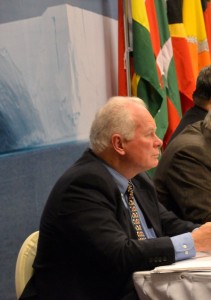November 30, 2011
A word from Ross Mountain: November 2011
Another year is drawing to a close and the humanitarian community is still grappling with the large-scale drought-driven emergency in the Horn of Africa. At the same time, the world’s main scientific body on the subject, the IPCC, is reaffirming links between climate change and extreme weather, particularly heat-related effects triggered by global warming.
The seventeenth meeting of UN climate talks, now in their third decade, are also picking up in Durban, South Africa – for an African “COP”. But international climate politics look more than ever like a series of great ships passing in the night. An emerging group of countries, however, may just provide a beacon in the dark.
Most of the world is calling for an extension to the Kyoto Protocol set to expire next December. Yet the biggest industrialized emitters from Japan and Russia to Canada are self-professed Kyoto dropouts.
The US meanwhile continues as the climate delinquent not having ratified Kyoto in the first place and not either looking to do so now. These days climate skepticism is widespread in America and almost the norm for the Republican Party – a detrimental shift for climate change even from what we all thought were the dark years of the George W. Bush era. Odd considering the US may just be the developed country worst hit by the negative effects of climate change – at least according to DARA’s Climate Vulnerability Monitor.
On the eve of Durban, Bangladesh hosted a ministerial meeting of the Climate Vulnerable Forum, which convened countries worst affected by climate change, and involved DARA. That Forum forged out a strongly worded 14-point Declaration adopted by 19 developing countries and committing to moral leadership and to low-carbon development as “an independent strategic choice” – this amid the heavy pollution of vibrant downtown Dhaka.
As it happens, urban air pollution is already killing millions of people according to the World Health Organization. Indeed, cleaner air and more advanced energy-efficient technologies are something developing countries are aspiring to. Dhaka’s pollution would actually be worse if authorities hadn’t already taken steps to reduce its intensity. Lower pollution also goes hand-in-hand with higher levels of development. Higher pollution is almost a direct consequence of poverty.
The poorer developing countries are especially looking for fast ways to increase and sustain their economic development since many are so far behind. Green technologies are increasingly seen as an avenue for boosting growth. In fact, some developing countries seem to be taking green growth more seriously than the rich. China, for instance, may now be the world’s largest emitter of CO2. But it is also investing by far the most of any country in the greening of its breakneck economy – three times the amount of GDP committed by the US, according to Pew Charitable Trusts.
This direction is starting to look more attractive than burying medium-term growth prospects in the dramatic inflation, health hazards and environmental devastation associated with an outdated carbon economy. And so the Dhaka Forum firmly opened a third way. The only problem is it’s unlikely Forum members or any other vulnerable countries can do it alone.
Fortunately, some of the big players are listening. China and the UK were particularly vocal in respectively committing in Dhaka to support the Forum’s members through South-South cooperation and via clear flows of climate finance for developing countries up to and beyond 2012. South-South cooperation is particularly important for vulnerable countries, since China has so effectively harnessed the Clean Development Mechanism to transfer technology and drive its economic growth. China still accounts for around one half of the entire mechanism’s activity. As our Trustee and Former President of Costa Rica, José María Figueres, pointed out that Africa as a continent has less than 3%.
Climate finance, technology and capacity building aimed at developing countries are a win-win for all. Support for mitigation in developing countries will generate new emission reductions that will be an integral part of any strategy for achieving a safe climate. Involving vulnerable developing countries in the green economy would increase opportunities for low-cost mitigation options that industrialized countries could access when attempting to meet their own commitments on emission cuts, especially via the Clean Development Mechanism.
Support for those hardest hit by climate change to adapt to its many very serious effects will curb loses to the hundreds of billions of dollars of tax-payer resources already spent on development aid (ODA) over the last decade as poverty reduction gains are being held or rolled back. Simply speaking, it will also save lives – we estimate up to 350,000 each year, mainly among children – and it will lessen pressure on international security and migration.
So far though, only a fraction of pledged finance, technology and other forms of support have been forthcoming. Now is the chance for governments to make that right. Durban is an opportunity to address in particular some of the basic points of the Dhaka Declaration as follows:
- Speed up the allocation and disbursal of so-called Fast-Start climate finance to match ODA funding rates.
- Ensure a 50:50 balance of climate finance resources between adaptation and mitigation, as well as transparent and coherent reporting by developed countries and prioritization on adaptation in favour of highly vulnerable countries that need this support the most.
- Specific commitments on the regular stepping-up of climate finance over the gap years from 2013 and 2020.
- A short-term continuation of the Kyoto Protocol with no gap between commitment terms.
- Continuity and concrete steps to achieve expanded access for wider numbers of developing countries to the Clean Development Mechanism.
- Clear progress towards the conclusion of a more comprehensive, longer-term agreement, capable of ensuring a fair and adequate response to climate change.
If Durban fails to deliver on the above, the lost opportunity will hurt everybody’s interests. If serious progress is made, all will gain.

Share this